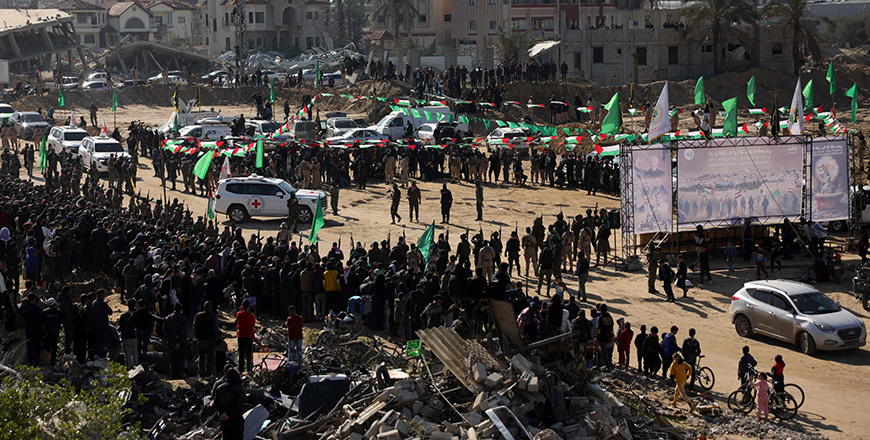KHAN YUNIS, Palestinian Territories — Palestinian fighters handed three Israeli hostages over to the Red Cross on Saturday, while buses carrying freed Palestinian prisoners rolled out of two Israeli jails in the latest exchange under an ongoing Gaza truce deal.
An AFP journalist saw masked Hamas militants parade the hostages onto a stage in Gaza's southern city of Khan Yunis, where they were told to address the crowd before their handover to the Red Cross.
Clutching gift bags given by their captors and a certificate to mark the end of their captivity, the three men, flanked by fighters, called for the completion of further hostage exchanges under the ceasefire deal.
Not long after, a busload of Palestinian prisoners departed the Israeli-run Ofer Prison and was greeted by a cheering crowd in the occupied West Bank city of Ramallah, an AFP journalist saw.
More buses full of prisoners pulled out of an Israeli prison in the Negev desert heading towards Gaza, according to another AFP journalist.
Saturday's swap, the sixth since the truce took effect on January 19, came after fears that the deal between Israel and Hamas was near collapse.
The Palestinian group had threatened to pause hostage releases over alleged violations, while Israel threatened to resume the war if it did, but on Friday both sides signalled the swap would go ahead as originally planned.
Scores of fighetrs were deployed and a crowd of onlookers turned out to watch the hostage release in Khan Yunis, as Palestinian nationalist music played in the background.
A crowd also gathered in Tel Aviv's "Hostages Square" to watch the exchange, with many carrying Israeli flags and posters with messages including "Sorry and welcome back" and "Complete the ceasefire".
The office of Israeli prime minister Benjamin Netanyahu had named the hostages as Israeli-American Sagui Dekel-Chen, Israeli-Russian Sasha Trupanov and Israeli-Argentine Yair Horn.
The Israeli military later confirmed all three were back in Israeli territory.
They had been held by Gaza fighters since Hamas's October 7, 2023 attack on Israel that sparked the war 16 months ago.
More talks
The Palestinian Prisoners' Club advocacy group said Israel was to release 369 inmates in exchange, with 24 of them expected to be deported.
Almost all of the rest are "prisoners from the Gaza Strip who were arrested after October 7", the group said.
After the deal had appeared to be on the brink of collapse, a Hamas official on Friday said the group expected talks on a second phase of the ceasefire to begin early next week. Another source familiar with the talks offered a similar timeline.
The negotiations on the second phase are meant to lay out steps towards a more permanent end to the war.
United States Secretary of State Marco Rubio, whose country is Israel's top backer and one of the truce mediators, is due to arrive in Israel late Saturday ahead of expected talks with Netanyahu on the Gaza truce.
Last week's release sparked anger in Israel and beyond after the freed hostages were paraded onstage, with their emaciated state sparking concern over conditions in captivity.
Israeli-American hostage Keith Siegel, released in a previous exchange, said he was "starved and... tortured, both physically and emotionally" during his captivity.
There were also fears for Palestinians in Israeli custody, and the Red Crescent said four of the released Palestinians were transferred to hospital.
Riyadh summit
The ceasefire has been under massive strain since US President Donald Trump proposed a takeover of the Gaza Strip under which the territory's population of more than two million people would be moved to Egypt or Jordan.
For Palestinians, any forced displacement evokes memories of the "Nakba", or catastrophe -- the mass displacement of their ancestors during Israel's creation in 1948.
The stage set up for the release on Saturday bore an illustrated poster appearing to depict the final moments of Hamas's leader Yahya Sinwar, who Israeli forces killed in October. It showed the Al-Aqsa Mosque visible through a hole in the wall of a destroyed building along with the slogan: "No displacement except to Jerusalem".
Arab countries have come together to reject Trump's plan, and Saudi Arabia will host the leaders of Jordan, Egypt, Qatar and the United Arab Emirates on Thursday for a summit on the issue.
A joint statement from the heads of Christian churches in Jerusalem on Saturday also spoke out against any forced displacement, saying Gazans "who have lived for generations in the land of their ancestors, must not be forced into exile, stripped of... their right to remain in the land that forms the essence of their identity".
Netanyahu's office said shortly after Saturday's release that it was working with the United States to free the remaining hostages "as quickly as possible", without offering specifics.
Israel's campaign has killed at least 48,239 people in Gaza, the majority of them civilians, according to figures from the health ministry in the Hamas-run territory that the United Nations considers reliable.
